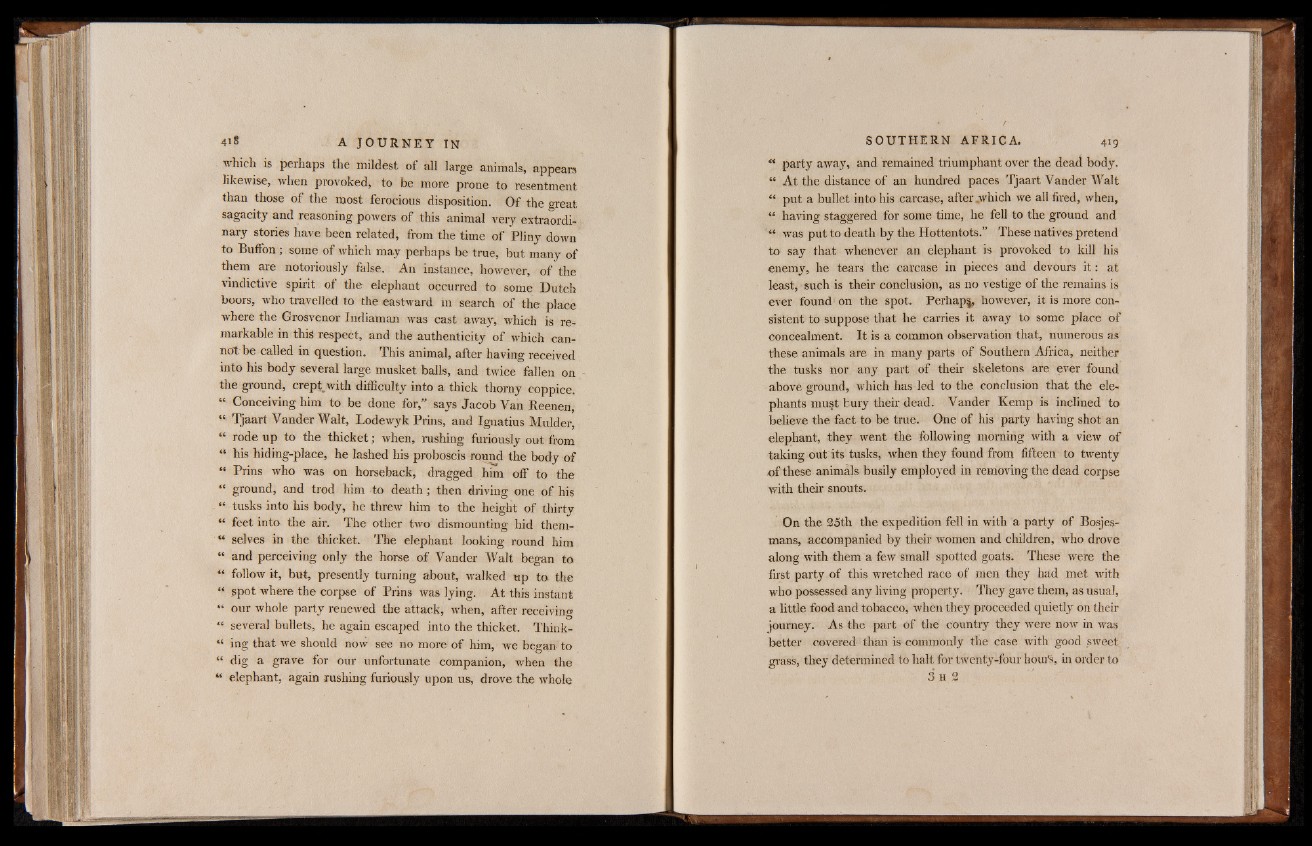
which is perhaps the mildest of all large animals, appears
likewise, when provoked, to be more prone to resentment
than those of the most ferocious disposition. Of the great
sagacity and reasoning powers of this animal very extraordinary
stories have been related, from the time of Pliny down
to Buffon; some of which ma.y perhaps be true, but many of
them are notoriously false. An instance, however, of the
vindictive spirit of the elephant occurred to some Dutch
boors, who travelled to the eastward in search of the place
where the Grosvenor Indiaman was cast away, which is remarkable
in this respect, and the authenticity of which cannot
be called in question. This animal, after having received
into his body several large musket balls, and twice fallen on
the ground, crept, with difficulty into a thick thorny coppice.
“ Conceiving him to be done for," says Jacob Van Reenen,
“ Tjaart Vander Walt, Lodewyk Prins, and Ignatius Mulder,
“ rode up to the thicket; when, rushing furiously out from
“ his hiding-place, he lashed his proboscis round the body of
“ Prins who was on horseback, dragged him off to the
“ ground, and trod him to death% then driving one of his
- “ tusks into his body, he threw him to the height of thirty
“ feet into the air. The other two dismounting hid them-
« selves in the thicket. The elephant looking round him
“ and perceiving only the horse of Vander Walt began to
“ follow it, but, presently turning about, walked up to the
“ spot where the corpse of Prins was lying. At this instant
“ our whole party renewed the attack, when, after receivin»
“ several bullets, he again escaped into the thicket. Think-
“ ing that we should now see no more of him, we began to
“ dig a grave for our unfortunate companion, when the
“ elephant, again rushing furiously upon us, drove the whole
“ party away, and remained triumphant over the dead body.
“ At the distance of an hundred paces Tjaart Vander Walt
*f put a bullet into liis carcase, after .which we all fired, when,
“ having staggered for some time, he fell to the ground and
“ was put to death by the Hottentots.” These natives pretend
to say that whenever an elephant is provoked to kill his
enemy, he tears the carcase in pieces and devours i t : at
least, such is their conclusion, as no vestige of the remains is
ever found on the spot. Perhaps however, it is more consistent
to suppose that he carries it away to some place of
concealment. I t is a common observation that, numerous as
these animals are in many parts of Southern Africa, neither
the tusks nor any part of their skeletons are ever found
above ground, which has led to the conclusion that the elephants
must bury their dead. Vander Kemp is inclined to
believe the fact to be true. One of his party having shot an
elephant, they went the following morning with a view of
taking out its tusks, when they found from fifteen to twenty
of these animals busily employed in removing the dead corpse
with their snouts.
On the 25th the expedition fell in with a party of Bosjes-
mans, accompanied by their women and children, who drove
along with them a few small spotted goats. These were the
first party of this wretched race of men they had met with
who possessed any living property. They gave them, as usual,
a little food and tobacco, when they proceeded quietly on their
journey. As the part of the country they were now in was
better covered than is commonly the case with good sweet
grass, they determined to halt for twenty-four hour's, in order to
3 h 2